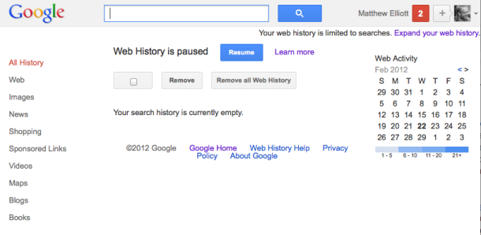How to remove your Google Web Data History
Do you know if Google is tracking your Web activity? If you have a Google account (for, say, Gmail) and have not specifically located and paused the Web History setting, then the search giant is keeping track of your searches and the sites you visited. This data has been separated from other Google products, but on March 1 it will be shared across all of the Google products you use when Google's new privacy policy goes into effect.
If you'd like to prevent Google from combining this potentially sensitive data with the information it has collected from your YouTube, Google+, and other Google accounts, you can remove your Web History and stop it from being recorded moving forward.
After signing into your Google account, type https://www.google.com/history into your browser. (Alternatively, you can choose Account Settings from the pull-down menu in the upper-right corner of a Google product such as Gmail, Google+, or Google.com. From the Account Settings page, scroll down to the Services header and click on the "Go to web history" link.) If your Web History is enabled, you'll see a list of recent searches and sites visited. Click the gray Remove all Web History button at the top of the page and a subsequent OK button to clear your Web History.
Just the way I like it, empty and paused.
This action also pauses the Web History feature so that it will no longer track your Web searches and whereabouts. If you'd like to fire it back up, simply click the blue Resume button.

(Source: Electronic Frontier Foundation)
Data Doctors: Let's all get a grip on Google's privacy policy
Posted: Sunday, March 4, 2012 10:29 am
By Ken Colburn, Data Doctors
Q: I missed Googleís March 1 deadline to clear my history so does that mean that my information is now being shared or can I still clear it? ó Arnie
A: The amount of misinformation circulating around the recent changes to Googleís privacy policies is pretty amazing.
Letís make sure we have some proper perspective before we get into the details. If you havenít thought about it, we all use various Google products free of charge yet their stock is trading at $600-plus per share.
How can a company that gives its users a plethora of free products have such a high stock value? ADVERTISING!
Those of us that use any Google service (or Facebook or Yahoo or AOL or fill-in-the-blank free service) are actually the Ďproductí and the advertisers are the customers of that product.
Google has clearly created a multitude of powerful ways for advertisers to target customers which is why their stock price is so high.
This practice of using your behavior to generate targeted ads is nothing new (in fact, Google didnít invent it; they just out-did all their competitors).
If you are suddenly having a problem with this, you might want to take a deeper reality check into life in the digital age.
Your credit card companies and banks have been collecting this type of information on you since way before the Internet. Your cell phone reports your location to your cellular provider every seven seconds and virtually every website that you visit on the Internet knows what kind of computer or mobile device you are using (Windows, Mac, etc.) which browser you are using and your general location via your IP address.
Tracking Ďcookiesí get dropped on your machine with every click of your mouse and I am here to tell you that itís not all a conspiracy to dig into your personal life; itís all to sell you something. This is how things that we all take for granted every day are being paid for.
Google is not suddenly exposing your surfing habits and history to the whole world; they are simply consolidating what they already had from you.
Up until March 1, the privacy policies and information gathered at the various Google entities such as Gmail, Google Search, YouTube, etc. were all individual silos. This meant that there were 60 different privacy policies and data sets that we all read and understood (right?)
Google announced that they would be combining them all into a single policy and data set so they could improve what makes them the most money; targeted advertising.
If youíre really concerned about what Google collects and stores from you, they have an ample toolkit that gives you control over virtually everything at: http://www.google.com/privacy/tools.
The first item, the Google Dashboard ( https://www.google.com/dashboard, which requires you to log in to your Google account ) consolidates all of the major account settings with various ways to manage or remove anything you are concerned about.
If you are really uncomfortable with personalized ads, click on the Keep My Opt-Outs link to install an extension for Chrome that will do it for you. Personally, since ads are going to exist in my online life, Iíd prefer them to be relevant.
Iím not here to say that Google has been perfect with their information collection and data sharing policies, but neither has any of the other major online companies. Iíll leave that battle to the privacy advocates and foundations that spend their every waking minute digging into the intricacies of each privacy policy.
Iím not suggesting that you bury your head in the sand and just allow things to happen; you need to routinely monitor how these companies are using your info by checking your settings.
But, unless you are ready to unplug completely, your online behavior will continue to be the currency that drives most of what happens on the Internet, so spend it wisely!